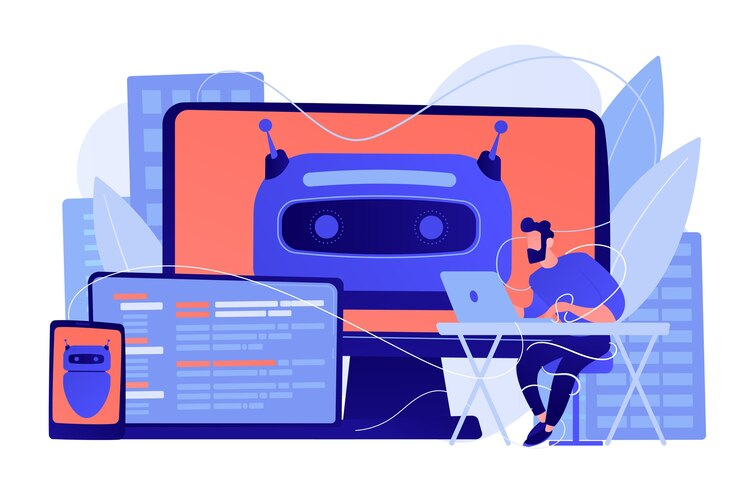
HOW ARTIFICIAL INTELLIGENCE HELPS IN MODERN SOFTWARE TESTING
ARTIFICIAL INTELLIGENCE Companies use artificial intelligence and software testing as powerful tools to improve the quality of their products by automating processes and effectively detecting errors through data analysis. Our guide examines the application of AI in software testing, offering strategies to optimize processes and ensure high product quality. Additionally, testing teams start to use AI to develop innovative test scenarios and improve testing strategies.
AI IN SOFTWARE TESTING
Artificial intelligence (AI) opens up new possibilities in technologies that mimic human intelligence and can solve complex tasks using computer algorithms. It effectively processes large volumes of information, finding applications in various areas, from automating routine work to forecasting trends and solving complex tasks. AI, in the context of software testing, can significantly improve the process, enabling faster, more efficient, and more accurate testing.
IMPLEMENTATION OF AI IN SOFTWARE TESTING PROCESSES
ChatGPT, developed by OpenAI, is an advanced manual testing tool based on advanced technologies. The role of AI in testing is to automate communication with the system, which allows you to get quick and accurate answers to testers’ questions. Also, it ensures high quality and uniformity of the testing process.
Generation Of Test Scenarios
ChatGPT can be used to automate the creation of API test scripts. For example, suppose you plan to perform a user authorization check. In that case, ChatGPT can generate a sequence of actions to check the token’s validity, the system’s response to invalid input, and other tests.
Test Data Generation
Instead of complex tools, ChatGPT can quickly generate test data. For example, you can get multiple email address options to verify the registration feature on your website.
Verification Of Texts
ChatGPT does an excellent job of detecting and correcting errors in texts. For example, you can use ChatGPT to automatically check for errors after updating a website. It analyzes the text and points out possible problems, allowing you to quickly correct them and maintain the high quality of the content.
Generation Of Combinations For Paired Testing
To effectively use artificial intelligence in testing, consider the possibilities provided by ChatGPT to optimize test scenarios. This allows you to reduce the number of required tests while maintaining a high level of coverage of all combinations of product properties that need testing.
Diagnostics And Troubleshooting
When faced with an unexpected problem, ChatGPT can suggest a solution using a description of the situation. For example, if a conflicting error occurs during testing, ChatGPT helps identify common causes of such errors and suggests potential ways to fix them.
Test Case Optimization
AI significantly improves testing efficiency. It analyzes existing test data to identify the most effective tests and remove redundant ones. For example, tools like Applitools use AI-based analytics to determine the optimal set of tests.

Advantages Of AI For Software Testing
Artificial intelligence is transforming the traditional software testing process, introducing new capabilities that were previously unavailable. It impacts the industry through improved accuracy, speed, and the ability to automate test processes. In case you may want to draft testers, you will be able to take advantage of all the benefits that AI offers for testing:
- Artificial intelligence significantly increases the speed and efficiency of the testing process by automating routine tasks, including regression testing. This allows you to analyze code and run tests significantly faster than manual testing. In addition, artificial intelligence provides a more stable and reliable testing process, as it minimizes the impact of human error;
- Reduced resource usage: Artificial intelligence effectively reduces the time and cost required to conduct software testing. It can execute test scenarios with high speed and accuracy, which allows you to optimally use resources and focus the team’s attention on other important tasks;
- Quality improvement: AI enables the detection of complex software issues and vulnerabilities that may be missed during manual testing, improving overall product quality and reducing the risk of severe problems in the future;
- Data analysis: AI can process large amounts of information, allowing you to identify trends and patterns during testing. This tool helps developers and testers make informed decisions based on objective data, which allows improving testing strategies;
- Adaptability: AI instantly adapts to new testing requirements and automatically responds to new scenarios without significant human effort. This provides greater flexibility and efficiency in testing.
CONCLUSION
AI provides an enhanced opportunity to improve software testing processes, allowing professionals in the field to use their skills more effectively. The human factor is recognized as a critical aspect of this process. Experts emphasize that AI should be seen as a tool that increases the accuracy and efficiency of testing, helps automate complex tasks, and ensures consistency of results.
READ ALSO: TECH FULL WORK